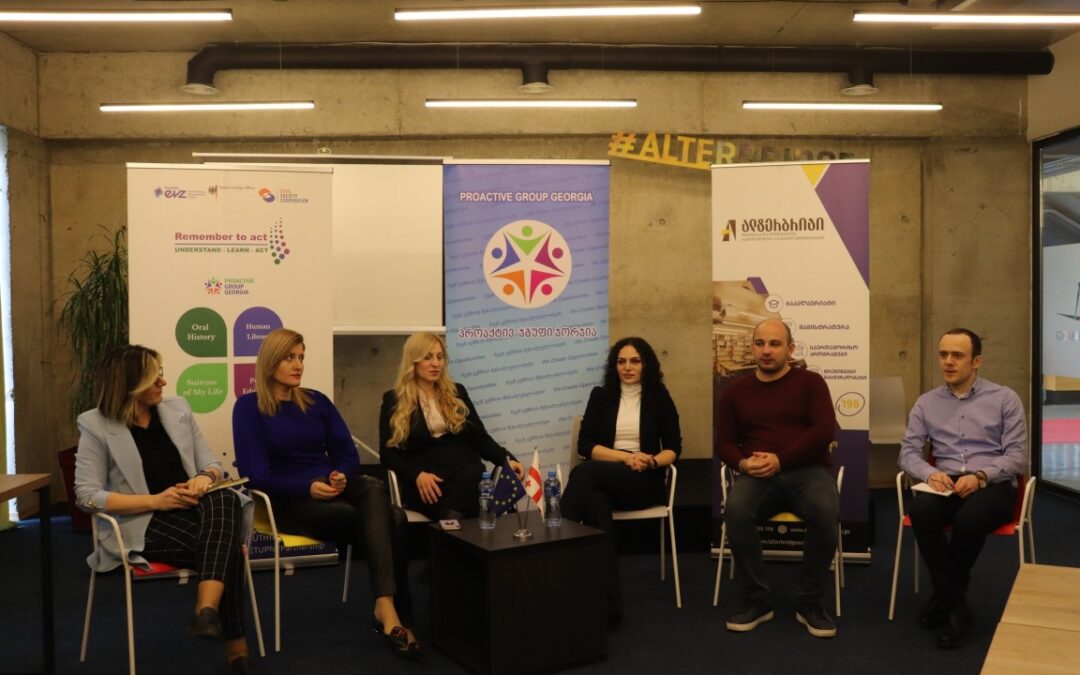By Irina Mikava, Civic Education Teacher, trainer, Team member of ProActive Group Georg
Young people from different municipalities, including Bolnisi, Tsalenjikha, and Tbilisi, were introduced to the concept of the Living Library method and its significance in the context of memory culture. The participants found the recommendations on organizing a Living Library intriguing. It emphasized the importance of defining initial goals, preparing and planning activities, selecting thematic elements for narratives, choosing „living books“ for the event, promoting the event, and conducting it successfully.
During the theoretical sessions, we explained the concept of a „living book“ to the participants, discussing the positive aspects of taking on a role and providing guidelines and tips. We explored the purpose behind telling stories, what we aim to achieve, and why we share our stories. Initially, some participants seemed hesitant, but as we introduced them to other people’s stories, encouraging them to share and communicate, they became more open and engaged.
Through the training, participants learned the structure of storytelling, including the introduction, main part, and conclusion. They discovered the significance of having an initial state, complications, and solutions in a story. The best way for them to grasp these concepts was through listening to practical stories and engaging in simulation tasks where they could honestly share their own stories and motivate others.
In addition to in-person meetings, we also conducted online sessions to ensure the participation of individuals from Bolnisi, Tbilisi, and Tsalenjikha, including young people and teachers. The online platform facilitated cross-cultural dialogue, enabling individuals from different regions to connect and exchange ideas. This inclusive approach was exemplified by Giorgi Agirbaya, who navigated his way from Abkhazia to create a successful non-governmental organization.“
Living Library in practice
The experience of listening to different stories is profoundly emotional, especially when hearing from individuals who have lost everything, endured the most challenging journeys, and faced the pain of losing family members, yet continue to fight and persevere. The „Living Books“ participants exemplified the significance of the knowledge gained from the workshop through their authentic stories, which the other participants listened to with keen interest, leading to engaging discussions. Each young person found great motivation in these stories, reinforcing the belief that every person’s unique narrative serves as a catalyst for another’s successful path.
During the sessions, participants had the opportunity to hear firsthand accounts of journeys from Abkhazia to the USA, witnessing how success stories emerged from the backdrop of immense challenges and socio-economic issues in Sokhumi. People of various ages gathered together, listening and empathizing with one another, transcending the barriers of war and conflict. It became evident that their shared quest for peace outweighed the adversity they had faced.
Challenges, Achievements and Future Goals ?
One of the main challenges we faced was initiating the sharing of emotions, stories, and desires. Narrating and sharing personal experiences can be a difficult task that requires individuals to trust and feel comfortable opening up.
However, the main achievement lies in the interest that followed the teaching and subsequent use of this method. The representatives of our target group have successfully employed this method in various educational settings, such as schools, youth clubs, and centers. Through their efforts, we have encountered individuals with unique stories that have become sources of motivation for many people.
To this day, we maintain ongoing communication and provide opportunities for the participants of our project. They, in turn, continue to create new opportunities for others by instilling a culture of remembrance and respect.
Looking ahead, our future goals include expanding the reach of this project, reaching more individuals and communities.By nurturing a culture of remembrance and respect, we strive to create a society where stories are valued and where the voices of all individuals are heard and acknowledged.

